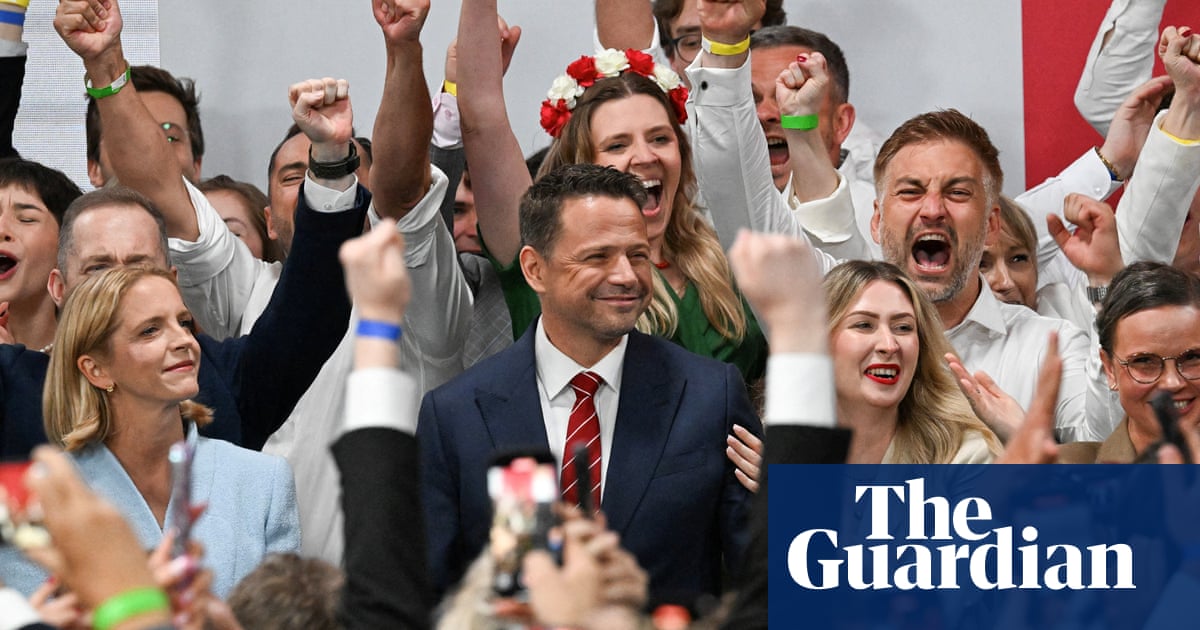An exit poll in Poland’s crucial presidential run-off suggested the race is too close to call, giving a slight lead to the liberal contender, Rafał Trzaskowski, but with the difference between the two candidates within the margin of error.
The poll by Ipsos Poland, released at 9pm local time (8pm BST) on Sunday as polls closed, put Trzaskowski, backed by the current government led by Donald Tusk, on 50.3%, with the rightwing contender Karol Nawrocki on 49.7%. The poll’s margin of error was 2%.
Despite the slim margin offered by the poll, Trzaskowski immediately appeared on stage in Warsaw to claim victory. “We’ve won!” he announced to cheers from the crowd, before giving a victory speech thanking his family and supporters. In a speech at his own campaign headquarters, Nawrocki did not concede, saying he remained confident he would win when all the votes were counted.
During a bitterly fought and often bad-tempered campaign, the two men have offered very different visions of Poland, and the result of the race will have enormous implications for the country’s political future, given the president’s ability to veto government legislation.
Trzaskowski is the pro-European, progressive mayor of Warsaw, who supports the liberalisation of abortion laws and the introduction of civil partnerships for LGBT couples. Nawrocki, a historian and former amateur boxer, has firmly rejected these moves and would likely veto any moves to implement them if elected.
The run-off came afterneither candidate achieved more than 50% of votes in a crowded first-round votetwo weeks ago. The winner will replace the outgoing president, Andrzej Duda, who will step down in August after completing two terms. Duda is a political ally of the rightwing Law and Justice (PiS) party, which ruled Poland until Tusk’s coalition won parliamentary elections in late 2023.
Tusk’s time as prime minister has been marked by difficulties bringing his broad coalition into line, but also by having an ideologically opposed president in office. While the presidential role is largely ceremonial, it does have some influence over foreign and defence policy, as well as the critical power to veto new legislation. This can only be overturned with a 60% majority in parliament, which Tusk’s government does not have.
Trzaskowski would smooth the way for Tusk to govern with intent, while a Nawrocki win would prolong the current deadlock, making it difficult for the government to pass any major reforms before the 2027 parliamentary election.
“Tusk knows the stakes and that if Nawrocki wins, he’s got a lame-duck administration for the next couple of years. And it will be worse than with Duda as Nawrocki will come in fresh, with a new mandate from what effectively turned into a referendum on the government,” Prof Aleks Szczerbiak, who teaches east and central European politics at the University of Sussex, said.
Trzaskowski, the Oxford-educated mayor of Warsaw since 2018, who previously held ministerial posts and served in the European parliament, has sought to project himself as a safe pair of hands to work with the government on implementing progressive reforms.
However, he has had to defend himself against suggestions he is out-of-touch and elitist, and against allegations about foreign funding for online advertising promoting his candidacy.
Sign up toThis is Europe
The most pressing stories and debates for Europeans – from identity to economics to the environment
after newsletter promotion
Nawrocki, a historian and former museum director, has been head of the Institute of National Remembrance, a state research body often accused of peddling a politicised version of history, since 2021. During the campaign, a number of scandals about his alleged past conduct were aired in the media.
In the final days of the campaign, both candidates soughtto court voters of candidates knocked out in the first roundand mobilise their supporters. “This election could be decided by single votes,” Nawrocki told a rally of supporters last week.
Trzaskowski also said every vote would be crucial. “Encourage everyone, so that as many Poles as possible vote in the presidential election,” he told a rally on Friday. A high turnout in the parliamentary vote in 2023, especially among younger urban Poles, was seen as crucial to securing victory for Tusk’s coalition.
